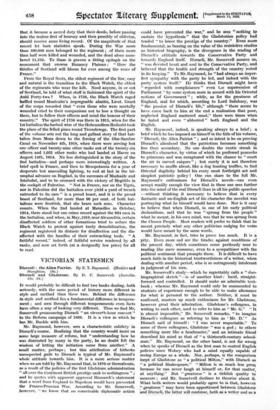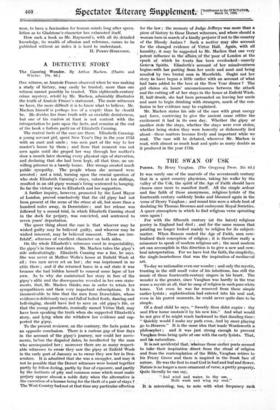VICTORIAN STATESMEN
IT would probably be difficult to find two books dealing, both seriously, with the same period of history more different in style and method than these two. Behind the difference in style and method lies a fundamental difference.in tempera- ment ; and seen through different temperaments even facts have often a way of looking very different. Thus we find Mr, Somervell pronouncing Disraeli " an eleventh-hour convert " to the Reform campaign of 1866. It is a view in which he has Mr. Buckle with him.
Mr. Raymond, however, sees a characteristic subtlety in Disraeli's course. Realizing that the country would insist on some large measure of reform, but " understanding how he was distrusted by many in the party, he no doubt felt the wisdom of letting the initiation come from another." A small matter, perhaps ; but this attribution of hitherto unsuspected guile to Disraeli is typical of Mr. Raymond's whole attitude towards him. It is a more serious matter when we are told by Mr. Raymond that, in 1870 or thereabouts, as a result of the policies of the first Gladstone administration " all over the Continent British prestige sank to nothingness " ; and he quotes with apparent approval Bismarck's statement that a word from England to Napoleon would have prevented the Franco-Prussian War. According to Mr. Somervell, however, " we know that no conceivable diplomatic action
could have prevented the war," and he sees " nothing to sustain the hypothesis " that the Gladstonian policy had tended " to lower the prestige of the country." Even more fundamental, as bearing on the value of the restrictive studies as historical biography, is the divergence in the reading of Disraeli's attitude towards the Conservative Party and towards ,England itself. Disraeli, Mr. Somervell assures us, devoted" was voted heart and soul to the Conservative Party, and believed that the health and strength of the country rested in its keeping." To Mr. Raymond, he "had always an imper- fect sympathy with the party he led, and indeed with the party -system itself." He thinks that Disraeli might have " regarded with complaisance " even, tie supersession of Parliament " by some system more in accord with his Oriental notions of Government " ; while, as for the greatness of England, zeal for which, according to Lord Salisbury, was " the passion of Disraeli's life," although " there seems to have come back to him at the end a realization that poor, neglected England mattered most," there were times when he hated and even " abhorred " both England and the English.
Mr. Raymond, indeed, is speaking always to a brief ; a brief which he has imposed on himself in the title of his volume, " Disraeli, the Alien Patriot " ; and so intent is he on proving Disraeli's alienhood that the patriotism becomes something less than secondary. No one doubts the exotic streak in Disraeli's character, by virtue of which he preferred peacocks to primroses and was enraptured with the chance to " court the air in carved caiques " ; but surely it is not therefore necessary to snuffle about, like a dog hunting truffles, to find Oriental duplicity behind his every most forthright act and simplest patriotic policy ! One can share to the full Mr. Raymond's enthusiasm for Disraeli's novels—can even accept readily enough the view that in these one sees further into the mind of the real Disraeli than in all his public speeches —without thinking it necessary to believe that in every fantastic and un-English act of his character the novelist was portraying what he himself would have done. Nor is it easy to believe that when Disraeli, in one of his early political declarations, said that he was " sprung from the people " what he meant, .in his own mind, was that he was sprung from the Chosen People. Most readers will prefer to think that he meant precisely what any other politician cadging for votes would have meant by the same words.
Mr. Raymond, in fact, tries to prove too much. It is a pity. Even more sad are the tirades against conditions of the present day, which sometimes come perilously near to reading like mere nonsense, even to a sympathizer with the political sentiment that prompts them. It is difficult to have much faith in the historical trustworthiness of a writer, when dealing with another period, who is so outrageously intolerant in judgment of his own.
Mr. Somervell's study—which he regrettably calls a " duo- biographical sketch "—is of another kind : lucid, straight- forward and controlled. It should make an admirable text- book ; whereas Mr. Raymond could only be commended to students of experience enough to be able to make allowance for what is personal to the author. Neither, it must be confessed, musters up much enthusiasm for Mr. Gladstone, however great their admiration. Gladstone's colleagues, in writing to each other, used to refer to him as " Mr. G." " It is almost impossible," Mr. Somervell remarks, " to imagine Disraeli's colleagues as referring to him as ' Mr. D.' " As Disraeli said of himself : " I was never respectable." To some of those colleagues, Gladstone " was a god ; to others something more like a headmaster," and an intimate friend described his mind as that of- " a thirteenth-century school- man." Mr. Raymond, on the other hand, is not far wrong when he speaks of Disraeli as the first man to control English policies since Wolsey who had a mind equally capable of seeing Europe as a whole. Nor, perhaps, is the comparison inept of Gladstone as " a political Milton," with Disraeli as " a political Shakespeare." " Milton is so much less great because he can never laugh at himself or, for that matter, at anything." But " greatness " is a ticklish quality to measure ; and Mr. Somervell declines to theorize about it. What both writers would probably agree to is that, however " greatness " may have been apportioned between Gladstone and Disraeli, the latter will continue, both as a writer and as a
man, to have a. fascination for human. minds long after, specu- lation as to Gladstone's- character has exhausted itself.
How. such a book as-Mr. Raymond's, with all its .detailed knowledge, its wealth of allusion and reference, comes to be published without an index it is hard to understand.
H. PERRY-ROBINSON.































































 Previous page
Previous page